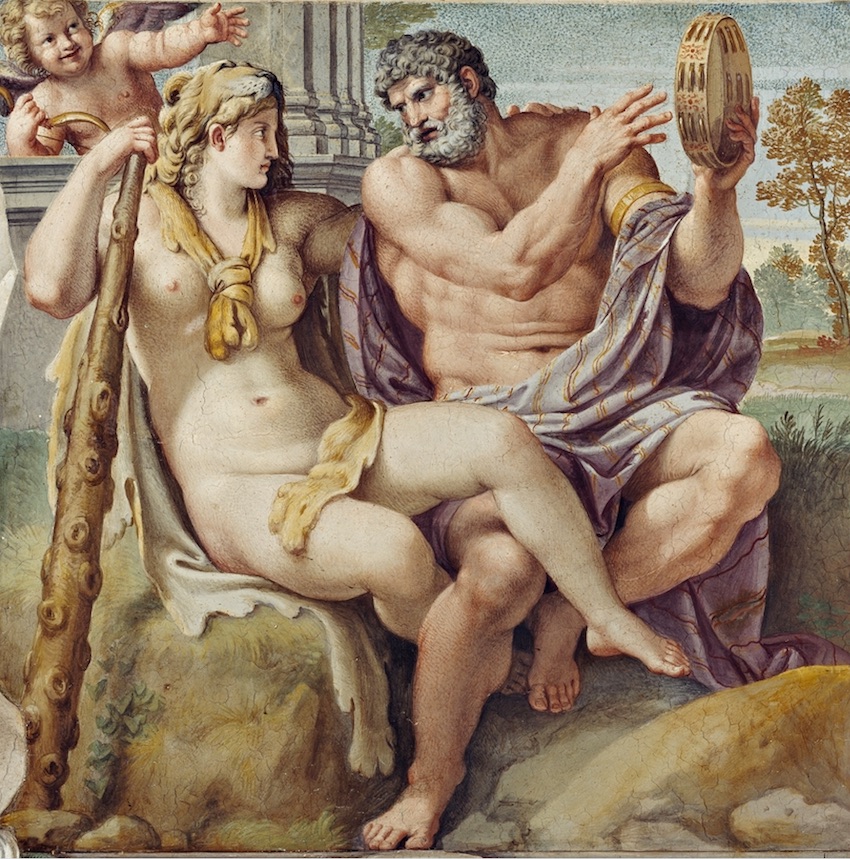HERAKLESí FURTHER ADVENTURES
Although he had now won immortality, the rest of Heraklesí life is not
much different from the period of his labors; he will again be driven mad, he
will become a servant again, and he will spend most of his time sacking cities,
fighting innumerable monsters and formidable opponents (especially those who
irritated him during the labors), and, in general, occupied with the
interminable task of proving his manliness and heroism.
EURYTOS AND IOLE

Annibale Carracci, Hercules and Iole (1597-1601), Farnese Gallery, Rome
In those versions where Megara is still alive, Herakles now gave her to
Iolaos. Wanting a new wife, he went to participate in the archery contest which
Eurytos of Oichalia, Heraklesí former archery instructor, was holding for the
hand of his daughter Iole. Although Herakles won the contest (and the support
of Iphitos, Eurytosí oldest son), Eurytos feared that Herakles would again kill
his children and refused to give Iole to him. He got Herakles drunk at a
banquet after the contest and drove him out of his land.
Shortly
afterwards twelve mares (or cows) of Eurytos were stolen and came into Heraklesí
possession; some said that the famous thief Autolykos had taken them, and sold
them to Herakles, while others said that Herakles himself robbed Eurytos to get
revenge for the treatment he had received at Oichalia. Eurytosí son Iphitos,
while searching for the mares, first met Odysseus and exchanged weapons with
him, then came to the home of Herakles in Tiryns. Herakles entertained him,
then went mad and killed him by throwing him from the walls of Tiryns.
Once again Herakles had to be purified for murder. He went first to Pylos in
the southwestern corner of the Peloponnese and asked king Neleus to perform the
ceremony, but Neleus, who was a friend of Eurytos, refused (although Nestor,
youngest of Neleusí twelve sons, favored Heraklesí request). He then went to
Amyklai (near Sparta) and was purified by a certain Deiphobos. Since he still
suffered from a terrible disease because of his crime, he now went to Delphi and
asked the Pythia (the Delphic priestess) how he could be cured. When she did
not answer immediately he decided to carry off the oracular tripod and set up
his own oracle, but Apollo appeared and began to fight with Herakles for the
tripod. The battle ended when Zeus threw a thunderbolt between the combatants,
just as he intervenes in the battles of Herakles with Kyknos and Ares. Herakles
now received an answer from Apollo and the Pythia, that he would be released
from sickness only if he was sold into slavery for three years (or one year) and
if the price paid for him was given to Eurytos as recompense.
This cycle
of madness, murder, and slavery repeats the events which first forced Herakles
to perform the labors for Eurystheus, and some versions have Herakles kill his
family (instead of Iphitos) after the labors were completed.
According to Euripides and Hyginus, the usurper Lykos tried to kill Heraklesí wife and children while Herakles was finishing his final labor. Herakles returned home in time to prevent this, but Hera drove him mad and he killed them himself. In Euripidesí account Herakles was about to commit suicide when Theseus arrived and took him to Athens; Hyginus has Herakles go to Delphi and steal the tripod, whereupon Zeus orders him to return it and Apollo tells him that he must become a slave.
The battle between Herakles and Apollo over the Delfic tripod is portrayed on the pediment of the Treasury of the Siphnians, in the Museum at Delfi.
